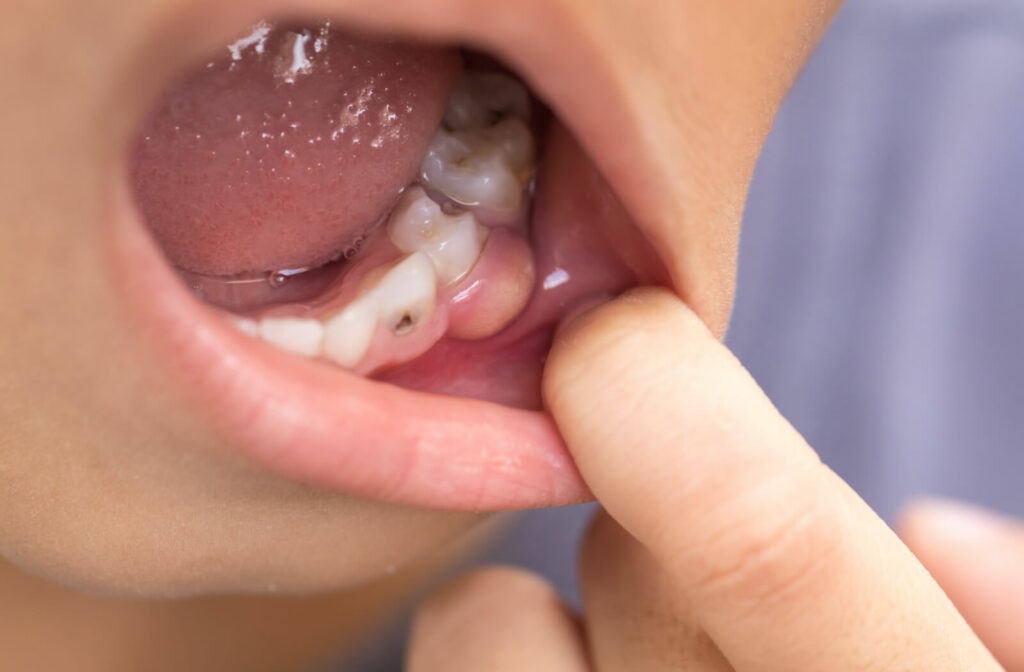I think we can all agree that getting a cavity isn’t fun. They can cause tooth sensitivity and toothaches, but did you also know that cavities can cause bad breath?
Yes, cavities can contribute to bad breath, but they are not the only culprit. Bad breath can also be caused by things like poor oral hygiene, consuming certain foods and drinks, dry mouth, certain medical conditions, and smoking.
If you are experiencing persistent bad breath, it is best to consult with your dentist to determine the underlying cause and receive proper treatment. In some cases, chronic bad breath can be a sign of serious dental issues like gum disease.
First Off, What Is a Cavity?
A cavity is a hole that develops in the hard surface of your teeth. Cavities are caused by tooth decay and develop over time. The decay starts to occur when acid produced by bacteria (plaque) in the mouth starts to attack the enamel – the hard outer layer of the tooth. Cavities start as tiny holes in the enamel but they can cause decay deeper into the tooth and even result in nerve pain.
If you have ever watched a toothpaste commercial, then you have definitely heard of plaque. Plaque is the sticky film of bacteria that forms on your teeth and gums. It is caused by eating a lot of sugars and starches and not properly cleaning off your teeth. The acids produced by plaque are what attack the enamel of the teeth and cause cavities.
Cavity Risk Factors
- Poor oral hygiene: As we discussed above, the acids in plaque are what cause cavities and tooth decay. Brushing and flossing your teeth regularly – twice a day, two minutes each time – can help remove plaque and prevent it from building up.
- A sugary diet: Don’t give in to your sweet tooth at the expense of your oral health. Eating or drinking an excess of sugary foods and drinks can cause your mouth bacteria to produce the acids that cause tooth decay. If you do eat something sugary or starchy, take the extra time to brush your teeth properly afterwards.
- Lack of fluoride: Fluoride is a naturally occurring mineral that helps strengthen enamel and can even reverse early-stage tooth damage. Many municipalities, including Toronto, have added fluoride to the public water supply and it is a common ingredient in toothpaste and mouthwash.
- Dry mouth: Dry mouth occurs when you are not producing enough saliva. Saliva is essential for keeping the mouth moist, and for washing away food particles and bacteria. Dry mouth can lead to other oral health problems, such as cavities, gum disease, and bad breath. The condition can be caused by a variety of factors, including certain medications, medical conditions, aging, and lifestyle habits, such as smoking or drinking alcohol.
- Acid reflux: Heartburn can cause stomach acid to flow into your mouth, which can wear down your teeth’s enamel and cause cavities.
- Eating disorders: Eating disorders like anorexia and bulimia can lead to tooth decay and cavities. Stomach acid from purging can wear down your teeth’s enamel, and disordered eating may also interfere with saliva production.

How Can Cavities Contribute to Bad Breath?
When you have a cavity, the decay can reach the inner layers of your tooth where bacteria can grow. These bacterias produce odours that can cause you to have bad breath. In some cases, an untreated cavity can become infected, which can also lead to bad breath.
How Can I Prevent Cavities & Bad Breath?
To help prevent bad breath caused by cavities, it is important to maintain good oral hygiene. Brush your teeth twice per day with toothpaste that contains fluoride and floss regularly. Checking in with your dentist regularly is another great way to detect and treat cavities early on.
Making lifestyle changes such as quitting smoking and cutting down on sugary snacks can also help prevent cavities. Properly rinsing down food, especially with fluoride-containing water, can promote strong enamel and prevent tooth decay.
As we’ve discussed, cavities can cause bad breath, but they are far from the only cause. If you have bad breath and have already revisited your dental hygiene and lifestyle habits, consulting with your dentist is likely necessary to identify the root cause of the issue.
Your Dental Dream Team
The team at Arch King West Dental is here for all of your oral health needs. Book an appointment at our clinic today and keep your breath smelling fresh.


